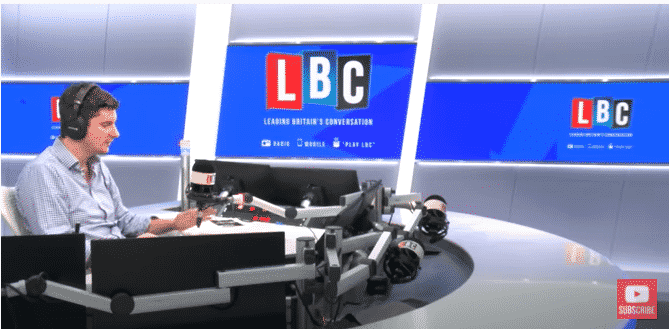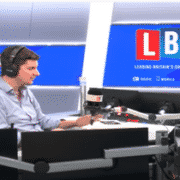In media interviews, when you don’t want to be drawn, don’t draw!
Interviewers often receive a lot of stick about using unfair amounts of pressure to force interviewees to reveal something they are trying to keep secret. In other words, to ‘draw’ something from them, when they are quite clearly trying not to be ‘drawn’.
Sometimes this criticism is justified.
But occasionally, interviewees themselves provide the impetus for such an approach, leaving the interviewer with little choice but to pursue them.
What follows is an unedited transcript of a two-and-a-half-minute extract from a recent live interview on LBC radio. Night-time host Tom Swarbrick was interviewing the Conservative MP for Bolsover, Mark Fletcher.

Tom Swarbrick
Swarbrick started by asking a general question about the two dramatic events in the House of Commons that day: the call from David Davis for the Prime Minister to ‘go’ and Mark Fletcher’s friend and former fellow Conservative MP Christian Wakeford crossing the floor to sit on the Labour benches. Fletcher’s response:

Mark Fletcher MP
MF: “Well, I find it very difficult to talk about Christian Wakeford – he’s a good friend of mine. And I know he’s been in a very difficult place personally and professionally for some time…”
That response, early on in the interview, was a classic example of the problem. If Fletcher had stopped after the first sentence and stuck to his guns, all would have been well. But his second sentence positively encourages further enquiry – which is precisely what happened:
TS: “What do you mean by that, ‘he’s been in a difficult place personally and professionally’?”
MF: “Well – I don’t want to reveal everything about our friendship – but, you know, he’s had a difficult time. And I’m not necessarily sure that this is the decision that the Christian Wakeford who was elected in the first place would make, and I think, you know, he will come to regret it. And I feel very sorry for him on that basis.”
For Swarbrick, this was clearly a rich vein to tap. Not only was there more to ‘reveal’ (Fletcher’s own word), several gems of information had already been extracted, including the fact that Fletcher believes his friend is not the same man elected in 2019:

Christian Wakeford MP
TS: “So, you’re suggesting that he’s changed somehow, since he was elected, to now.”
MF: “Yes.”
TS: “What’s changed him?”
MF: “Well, again, I don’t want to reveal anything that isn’t in the public domain, but I think, um, he has found many things, er, quite difficult, and…”
There’s a pattern here: the emergence of various tempting snippets of information (which often prompt more questions than answers), followed by a swift refusal to go further. Unusually, on this occasion, the interviewer explicitly points this out to his guest:
TS: “But I’m not sure Mr Fletcher this is a good idea to give a ‘nod-nod, wink-wink’ about someone’s personal behaviour or personal life, as being the motivation for them making a decision that you don’t agree with, without telling us what the problem is.”
MF: “No, no – that’s absolutely not my intention. My intention is to say that I am struggling between feeling betrayal from a friend and anger towards that friend, but also feeling, um, that perhaps I haven’t been a good enough friend over the past few months. And, you know, and it is a matter of personal regret to me that if I had been a better friend, perhaps he wouldn’t have done what he did today.”
Wow. This is powerful stuff, which in itself prompts the following – perfectly fair – line of enquiry:
TS: “In what way could you have been a better friend to help him?”
MF: “So, I think that he needed more support. Um, and I think he needed help through a difficult period of time, and, um, I wish we could have done more to keep him where he started.”
TS: “I still don’t quite understand what was difficult for him that perhaps hasn’t been difficult for you or, as of yet, any other of your colleagues who were elected in 2019?”
MF: “Obviously, we have faced some of the same pressures in regards to the pandemic and in regards to things that have happened in society – but I also think that Christian has been in a place in which, um, you know, he has struggled with a few things, and er…”
It’s time for the ‘teasing’ to come to an end. The ‘difficult’ nature of Wakeford’s situation has been mentioned several times. Plus there are his personal and professional ‘struggles’, as well as his need for ‘support’. So Swarbrick’s next question is almost inevitable:
TS: “Are you alluding to his mental health?”
MF: “I am not alluding to anything.”
TS: “Well, you must be alluding to something!”
MF: “I will not be drawn on that.”
TS: “But you drew it!”
Tom Swarbrick is right. As an interviewee, you are, of course, perfectly entitled to withhold any information or opinions that you wish. That is your choice, and no interviewer has a ‘right’ to extract them from you.
But what you cannot do – or at least cannot fairly expect – is to ‘tease’ your interviewer or ‘allude’ to something you could say (what Swarbrick describes as a ‘nod-nod, wink-wink’ approach) and then staunchly refuse to talk about it.
It’s not fair to you, it’s not fair to your interviewer, and it can end up revealing far more about the subject you are trying to keep under wraps than you had ever intended.
Images:
Tom Swarbrick – YouTube
Mark Fletcher MP – Wikipedia
Christian Wakeford MP – Wikipedia
- How to Avoid Podfade: Five reasons why podcasts fail (and how to stop yours being one of them!) - December 10, 2025
- Introducing the ‘Act Out’: - October 29, 2024
- Politics as Entertainment - July 2, 2024




Leave a Reply
Want to join the discussion?Feel free to contribute!